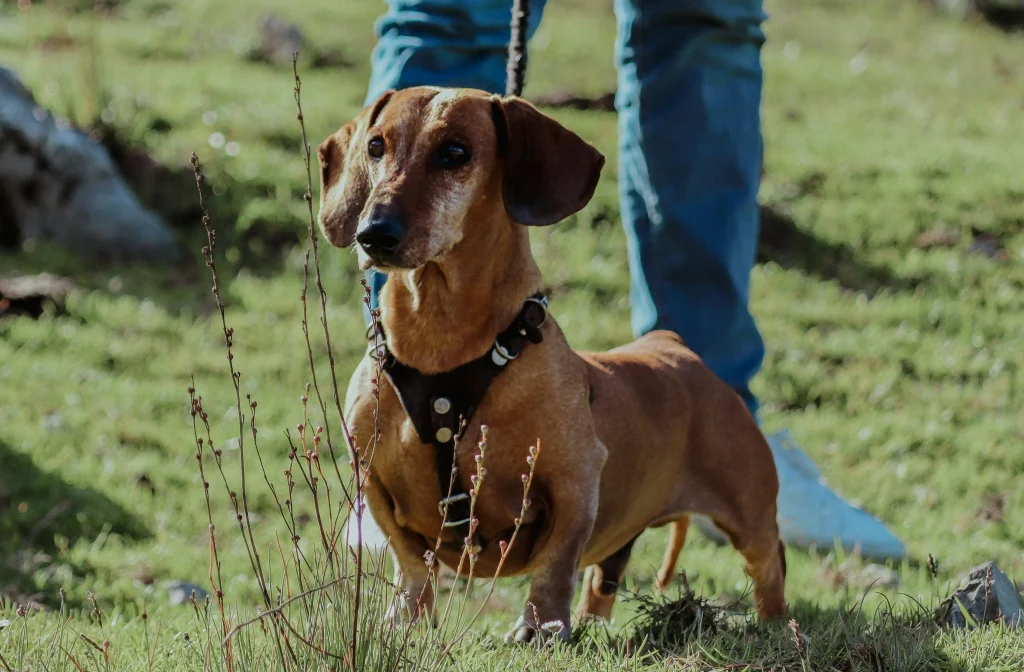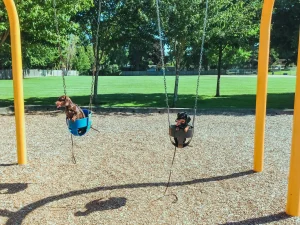Key Takeaways
- Dachshunds are known for their bold and courageous nature
- They have a strong hunting instinct and can be stubborn
- Dachshunds are loyal and affectionate with their families
- They require proper training and socialization from an early age
- These dogs have a playful and sometimes mischievous personality
- Dachshunds can be vocal and may bark frequently
- They have a strong prey drive and may chase small animals
- Regular exercise and mental stimulation are essential for dachshunds
For a quick overview, check out the infographic below summarizing the common personality traits of dachshunds.
Understanding Dachshund Personalities
Bold Nature
Why: Bred to hunt badgers, dachshunds are naturally brave.
Challenge: Confidence can sometimes border on stubbornness.
Hunting Instincts
Key Traits: Strong prey drive and love to dig.
Tip: Engage their instincts with games like hide-and-seek.
Loyal Companions
Bond: Dachshunds are devoted and affectionate.
Need: Thrive on attention, making them prone to separation anxiety.
Playful Yet Mischievous
Behavior: Entertaining antics keep them young at heart.
Challenge: Keep them engaged to prevent naughty behavior.
Vocal Tendencies
Common: Loud bark used to express excitement or alert.
Solution: Teach commands like “quiet” to manage barking.
Health and Care
Risk: Prone to back problems (IVDD).
Advice: Maintain a healthy weight and avoid excessive jumping.
Introduction to Dachshund Personality

Dachshunds, often called “wiener dogs” or “sausage dogs,” are a beloved breed known for their unique long bodies and short legs. But there’s much more to these little dogs than their distinctive appearance. As a dachshund owner and enthusiast, I’ve come to appreciate the complex and fascinating personality traits that make this breed so special.
Originally bred in Germany for hunting badgers and other small animals, dachshunds have a rich heritage that influences their modern-day personalities. Adult dachshunds typically weigh between 16 to 32 pounds, depending on whether they are standard or miniature size.
In this article, we’ll explore the common personality traits of dachshunds. We’ll dive into their bold nature, hunting instincts, and loyal companionship. Whether you’re considering adding a dachshund to your family or simply want to understand these charming dogs better, this guide will give you a comprehensive look at what makes dachshunds tick.
The Bold and Courageous Nature of Dachshunds

One of the most striking personality traits of dachshunds is their boldness. These small dogs have big personalities and aren’t afraid to show it. Dachshunds were originally bred to hunt badgers, which required a fearless temperament. This courage has stayed with the breed even as they’ve transitioned into family pets.
I’ve seen my dachshund stand up to dogs three times his size without hesitation. This boldness can be both endearing and challenging. It’s important for dachshund owners to channel this trait positively through training and socialization. A well-socialized dachshund will be confident without being aggressive or overly reactive.
Hunting Instincts and Stubbornness
The dachshund’s hunting heritage plays a significant role in shaping its personality. These dogs have a strong prey drive and love to dig and chase. This instinct can make them stubborn at times, especially when they’re on the scent of something interesting.
Training a dachshund requires patience and consistency. Their independent nature means they may not always listen to commands, especially if they’re distracted by a potential “prey.” Using positive reinforcement techniques and keeping training sessions short and engaging can help overcome their stubborn streak. Interestingly, approximately 30% of dachshund owners report difficulties in training due to the breed’s stubbornness, highlighting the importance of persistent and patient training methods.
Loyalty and Affection Towards Family

Despite their independent streak, dachshunds are incredibly loyal and affectionate with their families. They form strong bonds with their owners and often choose a favorite person in the household. This loyalty makes them excellent companions and devoted family pets.
Dachshunds love to cuddle and will often seek out laps to snuggle in. They thrive on attention and affection from their loved ones. This deep bond can sometimes lead to separation anxiety, so it’s important to teach your dachshund to be comfortable when left alone. Many dachshunds experience separation anxiety if left alone for extended periods, underscoring the need for proper training and gradually acclimating them to alone time.
The Importance of Early Training and Socialization
Given their strong personalities, early training and socialization are crucial for dachshunds. Starting from puppyhood, expose your dachshund to various people, animals, and situations. This helps prevent fear or aggression issues later in life.
Positive reinforcement training works well with dachshunds. They respond best to rewards like treats and praise. Consistency is key, as these clever dogs will quickly learn to manipulate situations if rules aren’t clear. With patience and persistence, you can shape your dachshund into a well-behaved and sociable companion. Studies show that well-socialized dachshunds are less likely to develop aggressive behaviors, emphasizing the importance of early and consistent socialization efforts.
Here are some essential tips to help you train your dachshund and manage their unique personality traits effectively.
Essential Training Tips for Dachshunds
1. Start Early
Why: Early training and socialization prevent fear or aggression later.
How: Expose your dachshund to new people, places, and pets.
2. Use Positive Reinforcement
Why: Dachshunds respond better to rewards than punishment.
How: Use treats, praise, and play to encourage good behavior.
3. Be Consistent
Why: Clear rules help manage their independent nature.
How: Keep commands simple and consistent across family members.
4. Keep It Short
Why: Dachshunds have short attention spans.
How: Limit training sessions to 10-15 minutes to keep them engaged.
5. Manage Barking
Why: Their vocal nature can lead to excessive barking.
How: Teach a “quiet” command and reward calm behavior.
Playful and Mischievous Tendencies

Dachshunds have a playful and sometimes mischievous side to their personality. They love to play and can be quite entertaining with their antics. This playfulness keeps them young at heart well into adulthood.
However, their mischievous nature can sometimes lead to trouble. Dachshunds are known for getting into things they shouldn’t, whether it’s digging in the garden or sneaking food from the table. Providing plenty of appropriate toys and activities can help channel this energy positively.
Vocal Nature and Barking Tendencies
One trait that often surprises new dachshund owners is how vocal these dogs can be. Dachshunds have a loud bark for their size and aren’t afraid to use it. They may bark to alert you of visitors, express excitement, or demand attention.
While some barking is normal, excessive vocalization can become a problem. Early training to control barking is important. Teaching your dachshund a “quiet” command and rewarding calm behavior can help manage this trait.
Strong Prey Drive and Small Animal Interactions
The dachshund’s hunting background gives them a strong prey drive. This can make them prone to chasing small animals like squirrels, rabbits, or even cats. It’s important to keep this in mind if you have other small pets in the home.
With proper introduction and supervision, many dachshunds can learn to coexist peacefully with other pets. However, their instinct to chase may never fully disappear. Always supervise interactions between your dachshund and smaller animals to ensure everyone’s safety.
Exercise Needs and Mental Stimulation

Despite their small size, dachshunds have moderate exercise needs. Regular walks and playtime are essential to keep them physically and mentally healthy. Without proper exercise, dachshunds can become bored and may develop destructive behaviors.
Mental stimulation is just as important as physical exercise for these intelligent dogs. Puzzle toys, training sessions, and games that engage their problem-solving skills can help keep their minds sharp and prevent boredom-related issues. Dachshunds require about 30 to 60 minutes of exercise daily, including walks and playtime, to maintain physical and mental health. Engaging activities like puzzle toys can significantly reduce boredom-related behaviors, which are common in this breed.
Adaptability to Different Living Situations
One of the great things about dachshunds is their adaptability. They can thrive in various living situations, from apartments to large homes with yards. Their small size makes them suitable for urban living, as long as they receive enough exercise and mental stimulation.
However, their adaptability doesn’t mean they’re low-maintenance. Dachshunds still need attention, exercise, and engagement regardless of their living situation. They’re not the type of dog content to be left alone for long periods without interaction.
Health Considerations and Their Impact on Personality
Like all breeds, dachshunds have some health considerations that can impact their personality. Their long backs make them prone to intervertebral disc disease (IVDD), which can cause pain and mobility issues. A dachshund in pain may show changes in behavior or temperament.
Keeping your dachshund at a healthy weight and avoiding activities that put stress on their backs can help prevent IVDD. Regular vet check-ups and a balanced diet are essential for maintaining your dachshund’s health and happy personality. It’s estimated that up to 25% of dachshunds may develop IVDD during their lifetime, making weight management and proper care crucial for their long-term health and well-being.
Building a Strong Bond with Your Dachshund
Developing a strong bond with your dachshund is one of the most rewarding aspects of owning this breed. These dogs thrive on attention and love from their families. Spending quality time with your dachshund through training, play, and cuddles will strengthen your relationship.
Remember that each dachshund is an individual with their own unique personality quirks. Embrace your dog’s individual traits while providing consistent guidance and love. With patience and understanding, you’ll develop a deep and lasting bond with your dachshund companion.
Conclusion
In conclusion, dachshunds are complex and charming dogs with a range of personality traits that make them unique. From their bold courage to their affectionate nature, these little dogs have a lot to offer as companions. Understanding and appreciating these traits will help you build a strong and lasting relationship with your dachshund.
Read More:
Frequently Asked Questions
Are dachshunds good with children?
Dachshunds can be good with children if properly socialized. However, their small size makes them vulnerable to rough handling, so supervision is important.
Do dachshunds shed a lot?
Dachshunds are moderate shedders. Regular brushing can help manage shedding, especially during seasonal changes.
Are dachshunds easy to train?
Dachshunds can be challenging to train due to their stubborn nature. Patience, consistency, and positive reinforcement are key to successful training.
How much exercise does a dachshund need?
Dachshunds need about 30-60 minutes of exercise daily, including walks and playtime.
Are dachshunds good apartment dogs?
Yes, dachshunds can adapt well to apartment living as long as they receive enough exercise and mental stimulation.







